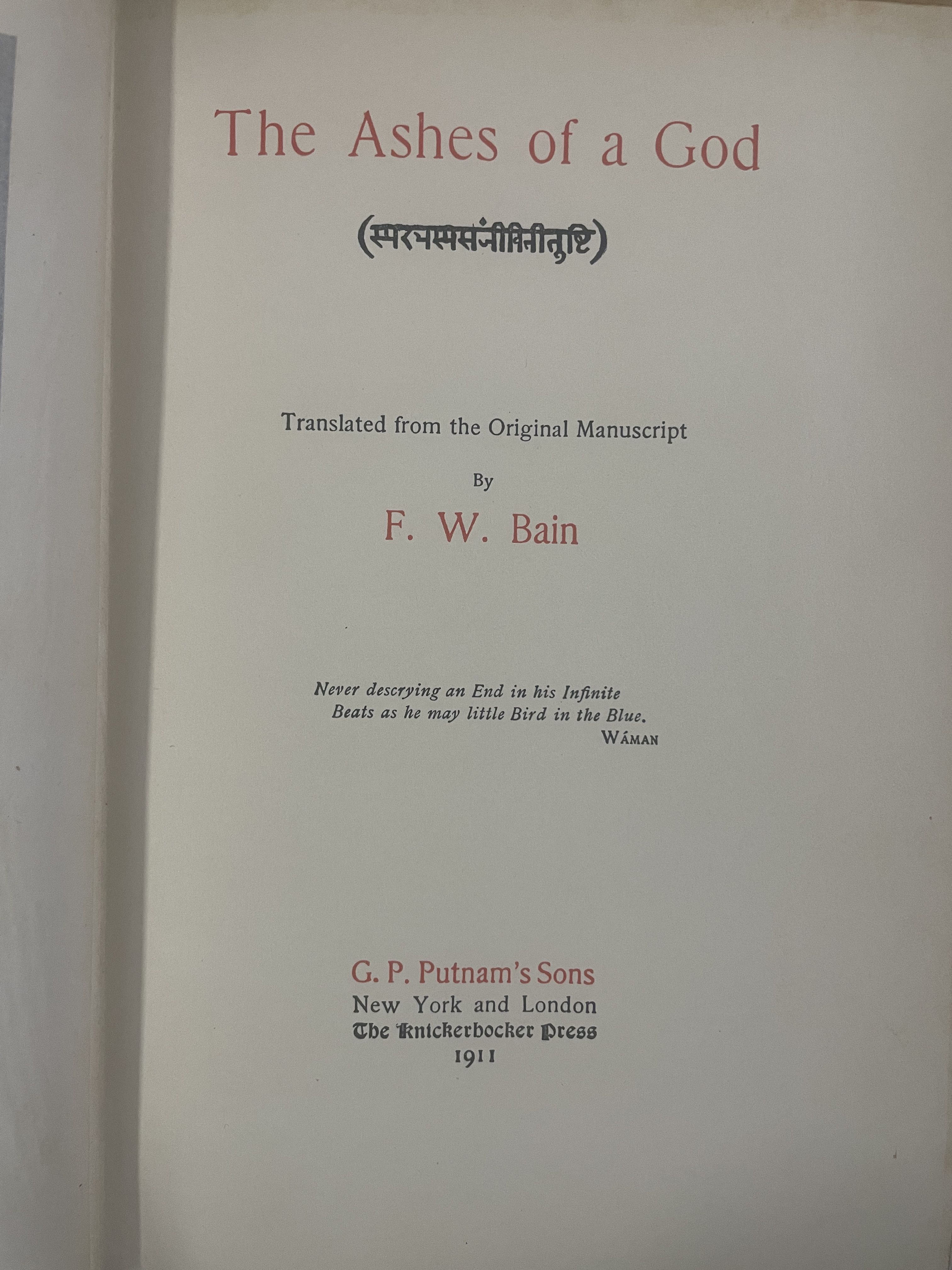The Ashes of a God

About
Summary
Exquisite
TOC
Details
Related
URL
Images
Overview
F.W. Bain's The Ashes of a God, published in 1911, is a captivating tale that weaves together Indian mythology, romance, and philosophy. Bain, known for his Indian Tales, demonstrates his deep appreciation for Sanskrit literature and Hindu culture in this work. The story explores themes of love, desire, sacrifice, and the illusionary nature of earthly life, all set against the backdrop of ancient India.
Importance of Book
Cultural Bridge: Bain's work serves as a bridge between Eastern and Western cultures, introducing Western readers to the rich mythology and philosophy of India.
Appreciation of Sanskrit Literature: Bain's surpassing love of Sanskrit is evident in his writing, which captures the beauty and depth of ancient Indian texts.
Exploration of Universal Themes: Despite being set in a specific cultural context, the story explores universal themes of love, desire, sacrifice, and the search for meaning.
Unique Narrative Style: Bain's writing is characterized by its lyrical prose, vivid imagery, and philosophical reflections, making it a unique and engaging read.
Key Themes
Love and Desire: The story revolves around the theme of love, particularly the disruptive power of desire. Indra, the king of the gods, sends an Apsara to disrupt the tapas (ascetic practices) of the sage Trishodadi. This highlights the tension between spiritual pursuits and worldly desires.
Illusion (Maya): Bain explores the concept of Maya, the illusionary nature of the world. Characters are often caught in fleeting moments of happiness and sorrow, only to realize the transient nature of these emotions. Love, in particular, is depicted as a bubble of foam, beautiful but ultimately evanescent.
Sacrifice and Renunciation: The story touches upon the themes of sacrifice and renunciation, particularly in the context of spiritual practice. The sage Trishodadi's tapas represents a commitment to renouncing worldly pleasures in pursuit of enlightenment. The Apsara's attempt to disrupt his tapas underscores the challenges of maintaining such discipline.
Duty (Dharma): The story also touches on the concept of dharma, or duty. Characters often grapple with their obligations to family, society, and the divine. The Apsara, for example, has a duty to Indra, even if it means disrupting the spiritual practice of a sage.
The Nature of Divinity: Bain explores the nature of divinity through the interactions of gods and humans. The story suggests that even the gods are subject to desires and emotions, and that the divine is not always benevolent or predictable.
Cultural Significance
Representation of Hindu Mythology: The story draws heavily on Hindu mythology, incorporating gods, goddesses, and mythical creatures into the narrative.
Reflection of Indian Philosophy: The book reflects key concepts from Indian philosophy, such as Maya, dharma, and the cyclical nature of time.
Exploration of Gender Roles: The story explores traditional gender roles in Indian society, particularly the expectations placed on women to be chaste and devoted.
Portrayal of Asceticism: The portrayal of the sage Trishodadi's tapas provides insights into the practice of asceticism in ancient India.
Effects on Society
It is important to note that The Ashes of a God was written by a Western author for a Western audience. Therefore, its direct impact on Indian society may have been limited. However, the book may have:
Increased Awareness of Indian Culture: The book may have contributed to increased awareness and appreciation of Indian culture among Western readers.
Challenged Western Perceptions: Bain's sympathetic portrayal of Hindu mythology and philosophy may have challenged Western perceptions of Indian culture.
Inspired Further Exploration: The book may have inspired readers to further explore Indian literature, philosophy, and culture.
Conclusion
The Ashes of a God is a compelling tale that blends Indian mythology, romance, and philosophy. The book's importance lies in its ability to bridge cultures, promote an appreciation of Sanskrit literature, and explore universal themes of love, desire, and the search for meaning. Bain's lyrical prose and vivid imagery create a captivating reading experience, while his philosophical reflections invite readers to contemplate the deeper questions of life.
Title
The Ashes of a God
Author
F W Bain
Name of Publisher
G P Putnam?s Sons The Knickerbocker Press
Publish Date
1911
Subject
A novel set in India and reflects Bain?s interest in Indian culture and mythology
Vintage
1901-1947
Number of Pages
152
Category
Religion
Sub Category
Literary
Rarity
RARE
